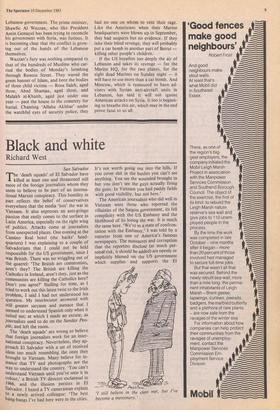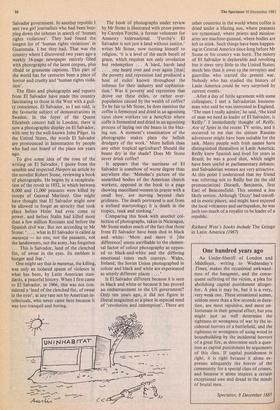Black and white
Richard West
San Salvador
The 'death squads' of El Salvador have killed at least one and threatened still more of the foreign journalists whom they seem to believe to be part of an interna- tional Marxist conspiracy. This hostility in part reflects the belief of conservatives everywhere that the media 'lost' the war in Vietnam. It also expresses an anti-gringo passion that easily comes to the surface in Latin America, especially on the right wing of politics. Attacks come at journalists from unexpected places. One evening at the Camino Real hotel (the hacks' head- quarters) I was explaining to a couple of Salvadorians that I could not be held responsible for the US government, since I was British. There was no wriggling out of the quarrel: 'The British are communists, aren't they? The British are killing the Catholics in Ireland, aren't they, just as the communists are killing the Catholics here? Don't you agree?' Stalling for time, as tried to work out this latest twist to the Irish Problem, I said I had not understood his question. My interlocutor answered with still greater sarcasm and menace that seemed to understand Spanish only when it suited me; at which I made an excuse, as Journalists used to do on the Sunday Peo- ple, and left the room.
The 'death squads' are wrong to believe that foreign journalists work for an inter- national conspiracy. Nevertheless, they ap- proach El Salvador with a set of received ideas too much resembling the ones they brought to Vietnam. Many believe for in- stance that TV and photographs are the way to understand the country. 'You can't understand Vietnam until you've seen it in colour,' a British TV director exclaimed in 1966, and the illusion persists in El Salvador. I heard a TV cameraman explain to a newly arrived colleague: 'The best bang-bangs I've had here were in the cities.
It's not worth going out into the hills. If you cover shit in the bushes you can't see anything. You see the wounded brought in but you don't see the guys actually firing the guns. In Vietnam you had paddy fields with good visibility, but not here.'
The American journalists who did well in Vietnam were those who reported the villainies of the Saigon government, its fell complicity with the US Embassy and the likelihood of its losing the war. It is much the same here. 'We're in a state of confron- tation with the Embassy,' I was told by a reporter from one of America's famous newspapers. The massacres and corruption that the reporters disclose (at much per- sona; risk, it should be added) are openly or implicitly blamed on the US government which supplies and supports the El 'I still believe in the class become a mercenary.' war, but I've
Salvador government. In another republic I met two girl journalists who had been hop- ping down the isthmus in search of 'human rights violations'. They had found the longest list of 'human rights violations' in Guatemala. I bet they had. That was the country where I discovered two years ago a weekly 16-page newspaper entirely filled with photographs of the latest corpses, plus ribald or gruesome captions. This part of the world has for centuries been a place of horror and cruelty and 'human rights viola- tion'.
The films and photographs and reports from El Salvador have made this country fascinating to those in the West with a guil- ty conscience. El Salvador, so I am told, is the favourite subject of demonstrations in Sweden. In the foyer of the Queen Elizabeth concert hall in London, there is now a photographic display on El Salvador, with text by the well-known John Pilger. In the United States, the words El Salvador are pronounced in lamentation by people who had not heard of the place ten years ago.
To give some idea of the tone of the writing on El Salvador, I quote from the sensible and respected Harpers an article by the novelist Robert Stone, reviewing a book of photographs. He begins by a recapitula- tion of the revolt in 1932, in which between 8,000 and 11,000 peasants were killed by troops of General Martinez. One might have thought that El Salvador might now be allowed to forget an atrocity that took place before Hitler had even come to power, and before Stalin had killed more than a few million Russians and before the Spanish civil war. But not according to Mr Stone: ' . what in El Salvador is called la matanza — no one, not the peasants, not the landowners, not the army, has forgotten ... This is Salvador, land of the clenched fist, of sweat in the eyes. Its emblem is hunger and fear.'
One might say that la matanza, the killing, was only an isolated spasm of violence in what has been, by Latin American stan- dards, a peaceful history. When I first came to El Salvador, in 1966, this was not con- sidered a 'land of the clenched fist, of sweat in the eyes', at any rate not by American in- tellectuals, who never came here because it was too tranquil and boring. The book of photographs under review by Mr Stone is illustrated with prose poems by Carolyn Forche, a former volunteer for Amnesty International. 'Porches El Salvador is not just a land without justice,' writes Mr Stone, now turning himself to religion, 'it is a level of the earth bereft of grace, which requires not only revolution but redemption ... A hard, harsh land .... one heard over and over again [that] the poverty and repression had produced a host of exiles known throughout the isthmus for their industry and sophistica- tion.' Was it poverty and repression that drove out these exiles, or rather over- population caused by the wealth of coffee? To be fair to Mr Stone, he does mention the coffee is fermented and dried in an agonising tures show workers on a beneficio where coffe is fermented and dried in an agonising process of laying out the beans in the blaz- ing sun. A moment's examination of the photographs makes plain the hellish drudgery of the work.' More hellish than any other tropical agriculture? Should the beans dry in the shade? Does Mr Stone never drink coffee?
It appears that the nastiness of El Salvador is somehow of worse degree than anywhere else: `Meiselas's picture of the unearthed bodies of the American church workers, opposed in the book to a page showing mantillaed women in prayer with a small boy, are moving beyond their grisliness. The death portrayed is not from a stylised martyrology; it is death in the tropics, rank and stinking.'
Comparing this book with another col- lection of photographs, taken in Nicaragua, Mr Stone makes much of the fact that those from El Salvador have been shot in black and white: 'More and more it [the difference] seems ascribable to the elemen- tal factor of colour photography as oppos- ed to black-and-white and the differing emotional tones each conveys. Wales, Ireland, the Soviet Union photographed in colour and black and white are experienced as utterly different places ....'
Is El Salvador different because it is seen in black and white or because it has proved an embarrassment to the US government? Only ten years ago, it did not figure in liberal magazines as a place in especial need of 'revolution and redemption'. There are other countries in the world where coffee is dried under a blazing sun, where peasants are tyrannised, where priests and mission- aries are machine-gunned, where bodies are left to stink. Such things have been happen- ing in Central America since long before Mr Stone or his country was born. The misery of El Salvador is deplorable and revolting but it owes very little to the United States; much less than it owes to the terrorists and guerrillas who started the present war. Nobody who has studied the history of Latin America could be very surprised by current events.
After a day of futile agruntent with some colleagues, I met a Salvadorian business- man who said he was interested in England. 'The man 1 really admire; he said, 'the kind of man we need as leader of El Salvador, is Reilly.' I immediately thought of Reilly. Ace of Spies in the recent TV series, and it occurred to me that the sinister Russian adventurer might have been suitable for the task. Many people with Irish names have distinguished themselves in Latin America; Reilly knew Spanish and lived for years in Brazil; he was a good shot, which might have been useful at parliamentary debates; and Salvadorian women are very attractive. At this point I understood that my friend was referring not to Reilly but (in the old pronunciation) Disraeli, Benjamin, first Earl of Beaconsfield. This seemed a less likely notion. Although 'Dizzy' had travell- ed in exotic places, and might have enjoyed the local volcanoes and earthquakes, he was juch too much of a royalist to be leader of a republic.
Richard West's books include The Gringo in Latin America (1967)















































 Previous page
Previous page